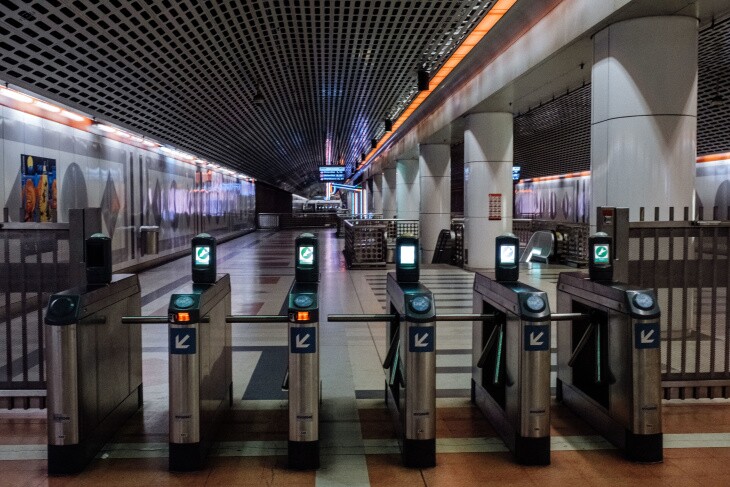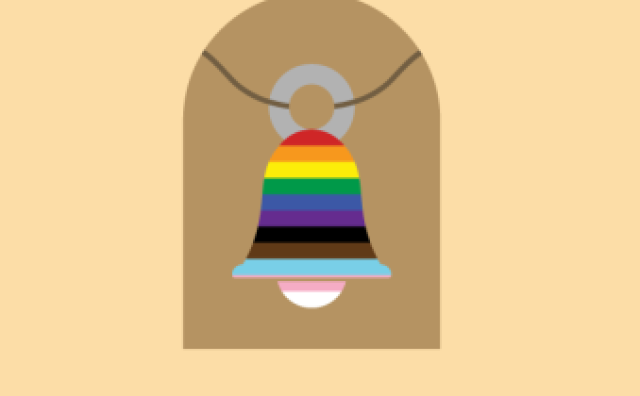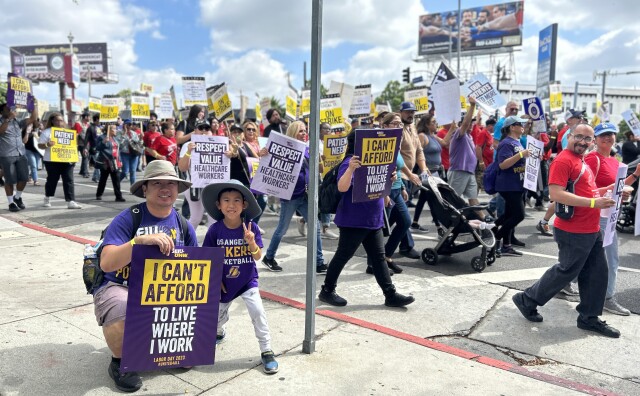Most LA Metro Riders Could Ride For Free Starting Next Year Under New Pilot Plan

Our news is free on LAist. To make sure you get our coverage: Sign up for our daily newsletters. To support our non-profit public service journalism: Donate Now.
Free bus and train trips on Los Angeles County's regional transit system could become a reality for many riders starting with a pilot program next year.
L.A. Metro CEO Phillip Washington launched a task force in September to study how the county's transit agency could transition to a fare-free system. Under the leading concept presented to Metro's board of directors Thursday, the agency would launch a two-phase pilot program in January 2022.
WHO WOULD QUALIFY?
The first phase would allow low-income riders to ride Metro's buses and trains for free. The transit agency reports that about 70% of its current riders earn less than $35,000 annually and would qualify for free fares under the current proposal. Metro staff projects free transit "would save riders up to $1,200 each annually."
Then in August 2022, fareless transit would extend to all K-12 students in the county.
Under the current model being studied, free fares would be offered on Metro's bus and train lines. Municipal transit operators, Metrolink, Access Services, and Metro bikeshare and microtransit programs would not be included.
The pilot would run to June 2023, then Metro leaders could decide to continue or expand free transit to more riders and services.
IT'S STILL A WORK IN PROGRESS

Several Metro board members spoke in favor of the plan. L.A. Mayor Eric Garcetti, who chairs Metro's board, called it a "game changer" that would bring more equity to commuting in the region.
"By and large, driving -- outside the expense of your car -- is free for the use of the roads; it's a public good," Garcetti said. "It's time for us to treat public transit as a public good, too."
One challenge brought up by board member and L.A. City Councilman Mike Bonin: how will Metro know which riders qualify for free transit trips? Metro currently offers discounted fares to low-income riders, but Bonin said that program, Low-Income Fare is Easy (LIFE), only serves a fraction of the riders it's intended to reach.
Washington agreed that the LIFE program "has not been very successful" and said the agency will work to design an enrollment process that's easier for riders.
Bonin voiced concern that many riders who qualify for fareless transit might not have the documentation Metro could require them to submit to take part in the pilot. That could hinder residents who are undocumented or experiencing homelessness.
"I think we need to think about and be very realistic about whether or not the administrative burden of trying to separate 30% of the people [making] above $35K is so burdensome, that it isn't even worth it."
- Improving equity and economic parity for riders, a large portion of whom live under the federal poverty line
- Creating an incentive to take public transit over personal vehicles, which would help alleviate congestion in the county
- Rethinking public space and how cities are managing streets with more people moving in communities without cars

Metro ridership fell sharply in the early months of the pandemic and has been slow to recover. Washington said the system averaged roughly 1.2 million boardings per day in 2019. Current ridership is about 500,000 boardings per day. Metro estimates ridership will continue to nudge up and projects about 740,000 boardings per day by January 2022, when the pilot would launch.
HOW MUCH WOULD IT COST TO IMPLEMENT?
Metro staff is still developing the plan and will continue to update the board on its progress in the coming months. The board is slated to vote on a final program recommendation in May.
So, how much will this pilot cost to implement? Metro staff projects up to $335 million over its 18-month run. The majority of that price tag comes from the loss of fare revenue, but also includes the cost to increase transit service by hiring more bus and rail operators, as well as nearly $8 million for increased security.
Washington noted that the agency has been discussing the idea "that with more riders... perhaps we don't need as much security as we would think" and staff would continue to examine the issue.
Rider fares typically bring in hundreds of millions for Metro each year, but they represent a tiny slice of the agency's annual revenue. In its 2020 budget -- approved pre-pandemic -- fare revenues made up just 4% of Metro's projected resources for that fiscal year.
READ MORE ABOUT PUBLIC TRANSIT:
- Where (And Why) LA Metro Is Exploring 'Congestion Pricing' (AKA Making You Pay To Use Certain Roads)
- LA Metro Will Explore Ways To Replace Armed Policing On Public Transit
- Why Were LA Metro Buses Taking People Arrested In Protests To Jail?
- LA Metro Projects Ridership Could Take 2 Years To Return To Pre-Pandemic Levels
- Here's LA Metro's Plan To Get You Out Of Your Car And On A Bus
-
The project will rename most of the terminals and all of the gates with the goal of world-class signage that leans into psychology.
-
After San Gabriel's city council rejected the proposal as "too narrow", one city councilmember argued the entire DEI commission, created in the aftermath of George Floyd's murder, had "run its course."
-
A medical industry challenge to a $25 minimum wage ordinance in one Southern California city suggests health workers statewide could face layoffs and reductions in hours and benefits under a state law set to begin phasing in in June. Some experts are skeptical, however, that it will have such effects.
-
Sandhill cranes are returning to the Lake Tahoe basin after a century long hiatus in what many say is a conservation success story.
-
The Dodgers fired Mizuhara in March after Ohtani's lawyers accused him of stealing millions of dollars from the baseball player to place bets with an Orange County-based bookie.
-
Jackie’s partner, Shadow, refuses to abandon their unviable eggs, despite her attempts to nudge him along.






